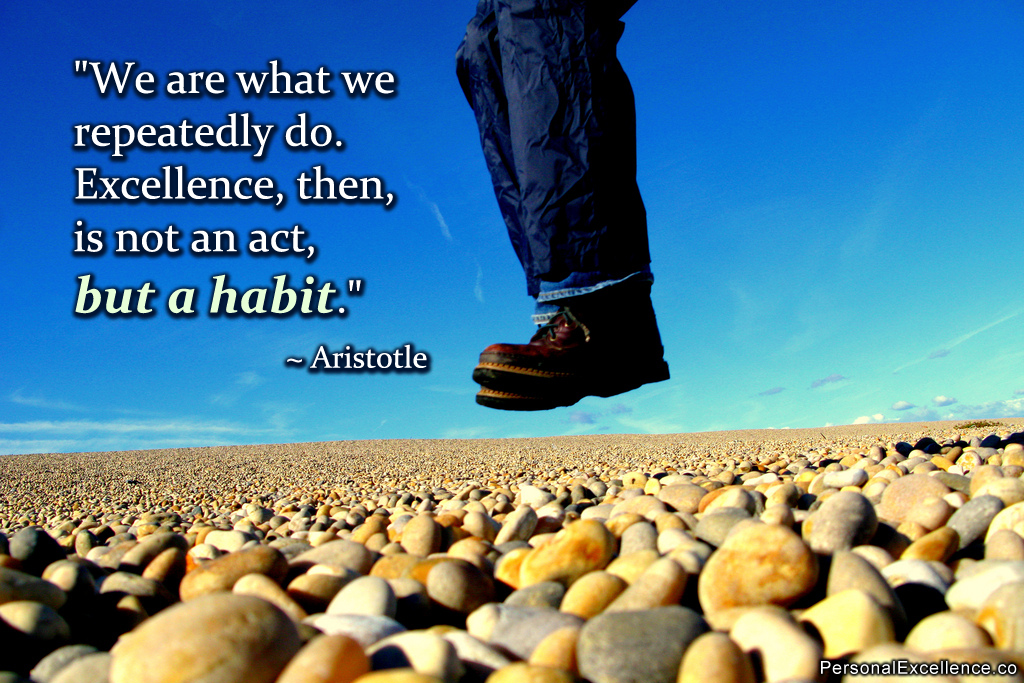Imprisoned By Habits
In The Greatest Salesman in the World, Og Mandingo writes “the only difference between those who have failed and those who have succeeded lies in the difference of their habits. Good habits are the key to success. Bad habits are the unlocked door to failure.” He then goes on to say “I have surrendered my free will to the years of accumulated habits and the past deeds of my life have already marked out a path which threatens to imprison my future.” Those last words are chilling.
Personal development is a lifetime process and becoming aware of our habits is critical to realizing our potential. The internet is full of books and articles that list successful habits. If change was as easy as just obtaining new knowledge we would all be perfect, but our brains are far too complex for creating behavioral change with knowledge alone.
According to “Should Habits or Goals Direct Your Life? It Depends”, all of our actions are either goal-driven conscious thought or habitual automatic behaviors. Goal-driven conscious thoughts require the “will power” of constant focus and mental energy to sustain. Habitual behaviors occur automatically on “auto-pilot” requiring very little mental energy or focus, which is why we hardly notice them. Do you actually remember making your bed this morning? How about brushing your teeth? We may recall these actions with effort, but most likely we perform our morning routines without much thought.
Automatic routines are ideal when they are good habits but what about those that are distracting or negative? Thanks to technology, most of us can access online social networks from our phones. Do you know how often you go online? Daily? Hourly? More often? Give it conscious thought. You may find it occurs more frequently than you realize. Habits develop in large part through repetition and the more we check our online feeds, the less we think about it when we’re doing it.
Habits burrow even deeper in our brains when the behavioral repetitions generate some form of positive reinforcement. Take texting for example… We all know that texting and driving is insanely dangerous, yet people do it all the time. The compulsion to check for incoming and send outgoing texts is all too often often unconscious and irresistible.
Look at other areas in your life where you might be operating on auto-pilot. How often do you stop for a latte and bagel before work? Do you regularly feed the office vending machine for some afternoon sugar? Is there a favorite late night TV show that keeps you up night after night? Or maybe you repeatedly hit the snooze button every morning? There are a vast amount of seemingly pleasurable actions that can become negative habits when ingrained without our conscious awareness.
Once we identify a habit we want to change the question becomes how to do it successfully. In the article “How The Brain Makes and Breaks Habits” the authors tell us that scientists can turn on and off automatic behaviors in rats through different brain manipulations. That sounds wonderful for our future except that they also write that the habits remain dormant and will reactivate given proper stimulus. For today, the only practical solution for controlling undesirable habits is to overlay them with good ones.
Creating a new behavior over an old one requires the use of focused conscious thought until the new habit is ingrained and becomes automatic. Giving something conscious thought is easy when our mental energy is high and focus is strong as it usually is in the morning. But, by late afternoon after a full day of work, it becomes more difficult to sustain the goal-driven process and old habits start to reassert. Why does restraint of pen, tongue and send button fail most often at night? How many times have we sworn we were not going to say or do something in the morning, only to end up saying or doing it that evening? When we are tired, conscious thinking becomes more challenging as does impulse control, making us more vulnerable to any habitual negative thoughts, emotions or actions. Make sense now why we are more apt to indulge ourselves after work?
When it comes to our habits, knowledge is power and knowing that our willpower weakens as we tire, tells us that we need to be smart and systematic in our approach to making changes. So, start off easy by addressing a morning habit first. Take that latte and bagel and swap it out for a homemade cup of coffee and some hard boiled eggs. Be sure to allow sufficient time for the new habit to become ingrained, a minimum 30 days of consistent repetition should do it. If we slowly work our way through our daily actions, cleaning up the undesirable habits in the morning first, those new good habits become ingrained freeing up more energy and mental focus to tackle the more stubborn ones that generally trigger at night.
Permanent change takes time, patience, persistence and a strong determination to do the work necessary to achieve the desired result. Don’t forget, the old habit isn’t actually gone it’s just dormant, so consistency is the key to success. The longer we follow the new behavior, the easier it is too maintain and the less frequently it will fail. So, we need to be diligent and realistic. Positive changes will always happen if we put in the effort!



